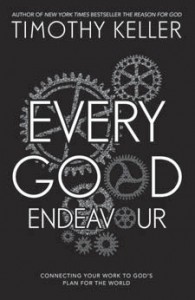 Every Good Endeavour: Connecting Your work to God’s Plan for the World
Every Good Endeavour: Connecting Your work to God’s Plan for the World
by Timothy Keller (with Katherine Leary Alsdorf)
Hodder & Staughton, 2012
Hardback, 287 pp, £12.99
ISBN: 9781444702590
Tim Keller has achieved prominence in recent years as founder-pastor of New York’s Redeemed Presbyterian Church, which has grown to 5,000 members since its inception in 1989. Keller’s holistic understanding of how the Gospel impacts this life helps explain this growth, attracting a large proportion of seekers and recent converts among the many young professionals who frequent it. Every Good Endeavour is a dependable yet positively disturbing book. It naturally fits into Tim Keller’s Reason for God apologetic theme, alongside his six other books including The Prodigal God and The Meaning of Marriage.
Perhaps this is why the book does not fit easily into one’s expectations of a biblical exposition on work, or an ‘airport easy read’, or an academic analysis. Every Good Endeavour is designed to provoke; it desires to reinvigorate; it aims to correct. It proceeds from Redeemer’s decade long investment in the Center for Faith and Work, which is led by Katherine Leary Alsdorf, a former hightech CEO. Every Good Endeavour bristles against the hollow, self-centred worldviews of the new atheists. Here we have a mirror to hold up to the blemishes in our own vain, confused, secular conceptions of work, which are inferior to the ideal that unfolds in Keller’s book. The three sections, modeled on a creation-fall-redemption structure are: ‘God’s plan for our work’; ‘our problems with work’; and ‘the gospel and work’.
In the first section, ‘God’s plan for work’, Keller discusses the design and dignity of work, starting with Robert Bellah’s challenge to “reappropriate” vocation in Habits of the Heart, which is implicitly based upon Os Guinness’s The Call, Abraham Kuyper’s Princeton Lectures, and ultimately Calvin. Keller writes, “Not since the Protestant Reformation has there been so much attention paid to the relationship of Christian faith to work as there is today” (p.19). Keller then describes work as a combination of cultivation of God’s world and service to others. He writes that ‘One of the main ways that you love others in your work is through the “ministry of competence”’ (p.76), drawing on the writings of Martin Luther and Dorothy L. Sayers, and citing the example of an airline pilot using his experience and skill to avert a major disaster.

Finding satisfaction in work
In the second section, ‘Our problems with work’, Keller describes the danger of work becoming fruitless, pointless, and selfish. Instructive examples include court composer Antonio Salieri’s frustration at his own modest abilities compared with Mozart’s effortless genius; and a more contemporary problem of Debbie, who resigned her job as a successful interior decoration consultant after beginning to “question my motivation for encouraging people to … spend huge sums of money on furniture.” (p. 109), and went on to work for her church and senator. These modern examples are complemented by biblical hermeneutics. The Ecclesiastes “meaningless” diatribes are balanced by aphorisms such as “a person can do nothing better than to… find satisfaction in their own work,” (Ecclesiastes 2:24). Esther’s elevation “for such a time as this” (Esther 4:14) reminds believers of the peril of being “in the Palace”: “Unless you use your clout, your credentials, and your money in service to the people outside the palace, the palace is a prison… if you are unwilling to risk your place in the palace for your neighbours, the palace owns you” (p.123). Keller uses a passage from Luther’s Treatise Concerning Good Works to cut deep to the heart of idolatry: ‘All those who do not at all times trust God and…His favour, grace and good-will, but seek His favour in other things or in themselves…practice real idolatry. If we do not believe that God is gracious to us and is pleased with us…then it is all pure deception, outwardly honouring God, but inwardly setting up self as a false god” .
This sets up a paradigm to see idols, “literally everywhere” in modern life: “in the acquisition of power, or the experience of pleasure…trust in… moral virtue, or acts of devotion or ministry” (p.133). Keller then investigates the idols of traditional, modern and postmodern culture. Traditional cultures tend to idolise family, race, nation, or social stability. Modern cultures tend to idolise reason, empiricism and freedom. Postmodern cultures tend to idolise progress, means-without-ends, pleasure and pragmatism.
In the third section, ‘The gospel and work’, Keller demonstrates how “the Bible’s view of work is so compelling and so helpful in all cultures, social settings, and vocations, because it is so rich and multi-dimensional” (p. 152). He aims to give a new story for work, in the sense of MacIntyre’s “enacted narrative” (p.158), and contrasts the gospel with other worldviews. If the whole world is good, albeit fallen, and with a redeemed future, this has implications especially to our work: “You are not your own; you were bought at a price,” (1 Corinthians 6:19-20). I disagree with Keller when he writes, “remember that an idol is a good thing that we make into an ultimate thing” (p.165), because many idols are inherently perverse, and inimical to the Gospel (1 Timothy 6:10; Galatians 5:19-20: love of money, ambition, hate). However, the majority of Keller’s argument holds, that corporate profits are a healthy means to a good end, in terms of creating and distributing new products and rewarding investors. Examples of redemptive business models include Hershey’s funding orphanages and Don Flow’s contemporary automobile dealership. Keller’s ‘new’ conception of work is partnering with God in his love and care for the world, and a sensitive new moral compass for work. The culminating chapter, New Power for Work, shines with what Keller describes as Jesus’ “rest under the rest” (Matthew 11:28-30), and a new take on Colossians 3:23: “by serving the work you’ve been given you are serving God.”
In essence, Keller’s definition of being a Christian in business provides an encouraging and daunting conclusion. Namely, working for God is more than mere office-place evangelism or Bible studies; rather it requires an application of the gospel to all areas of our work-life and organisations (p. 169). This is, no doubt, a tremendous challenge to the comfortable!